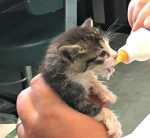Policies To Reinstate
- Open Sundays
Make the shelter accessible to the public on the weekend – the busiest days for shelter visits and adoptions, NOT closed or “by appointment only”.
- Open Wednesday evening
Provide shelter access until 8pm to the public, for those who work during the day and educational presentations.
- Educational Presentations
Extended evening hours can be used to host boy/girl scout troops and other youth groups, offer shelter tours and promote responsible pet ownership.
This presents an opportunity to advance humane education, particularly with children and young adults.
- Professional dog handler
Hire a professional dog handler to implement a training program for volunteers and adopters, promote safety, assess dogs and people for compatible and successful matches.
- Education Specialist
Hire an educational specialist to create pet profiles and promote adoptions through visitor interaction, social media, petfinder.com, advertisements and off-site events.
- Walk dogs
Staff to walk dogs at 8am upon arrival and just prior to closing.
This provides the animals with relief from their kennels and exercise.
It also reduces stress and promotes house breaking that can increase adoptability.
In addition, kennels will be cleaner and odors minimized.
- Volunteer Program
Encourage and welcome volunteers.
Schedule publically advertised orientations one Saturday per month.
Arrange private orientations for interested volunteers who cannot attend on Saturday.
Remove encumbrances that discourage volunteers, such as a mandated photo id taken by Public Safety at a separate location during M-F business hours.
- Photos
Permit photographs and videos of shelter animals by the public to promote adoptions and raise awareness of animals in need of homes.
- Statistics
Maintain and make public, statistics for shelter outcomes (intake, adoptions, owner redemptions, spay/neuter program etc.)
Analyze and identify trends, increases/decreases in numbers over time and implement ongoing improvements.
- Community Relations
Build relationships with residents, volunteers and rescue organizations to develop a network of support that will be mutually beneficial.
- Community Outreach & Pet Pantry
Establish a pet pantry, as part of a Community Outreach Program, for residents in need of pet food, feral cat colony feeders and local animal rescue organizations.
- Donations
Accept cat/dog food donations and other pet supplies for public distribution through the community pet pantry.
- Kitten Room
Establish a kitten room to enable enrichment, playtime and visitor interaction.
- Meet & Greet Room
Provide a suitable environment for pet interactions with visitors, volunteers and staff.
Room can also be used for volunteer orientations, educational presentations and shelter events.
- Vet Tech
Promote a qualified staff member or hire a Veterinary Technician to examine and medically treat shelter animals as needed and schedule appointments with local veterinarians when appropriate.
- Veterinarian
Establish partnerships with local veterinarians for professional and specialized services as needed, instead of a town employee veterinarian. (In Process?)
(In Process?) - Free/Low Cost Spay/Neuter Program
Partner with local veterinarians and other organizations offering spay/neuter services for companion pets.
- TNR (Trap/Neuter/Return) Program
Provide feral cat traps/rentals and assistance from ACOs AND Kennel Attendants with trapping/transportation/temporary housing as needed.
- No-Kill Policy
Maintain a no-kill policy whereby euthanasia is the only humane solution when an animal’s health, well being and quality of life cannot be maintained.
- Shelter Budget
Perform a thorough analysis of the shelter budget to minimize unneccessary expenses and appropriate funds in the most effective way possible.
- Website & Transparency
A shelter website promoting transparency by providing shelter information, such as policies, statistics, budgets etc., in addition to adoptable pet details.
- Shelter Supervisor
Hire a supervisor who will restore the public services, community involvement, animal care and fiscal responsibility mentioned above, that have fallen by the wayside over the past two (2) year “transformation”, under the management of Public Safety Director John Valentine and oversight of Councilwoman Lisa Inzerelli.
Policies To Discontinue
- Shelter Management
Remove Public Safety Director John Valentine, his $5K/yr stipend shelter management position and his authority to move funds from the shelter to public safety or other departments he manages. (In Process?)
(In Process?) - Shelter Liaison
Remove Councilwoman Lisa Inzerelli and appoint a new liaison who will work with, not against, the shelter supervisor and support the policies listed above.
Contact
Town of Smithtown
99 W. Main St.
P.O. Box 9090
Smithtown, NY 11787
| Supervisor Edward R. Wehrheim | (631) 360-7600 | ewehrheim@tosgov.com supervisor@smithtownny.gov |
| Councilman Thomas J. McCarthy | (631) 360-7621 | tmccarthy@tosgov.com |
| Councilwoman Lynne C. Nowick | (631) 360-7621 | lnowick@tosgov.com |
| Councilman Thomas W. Lohmann | (631) 360-7621 | twlohmann@tosgov.com |
| Councilwoman Lisa Inzerelli | (631) 360-7621 | linzerillo@tosgov.com |
| Email All | Click Here |
Click Here to provide updates or enter comments
Note: The above policies should apply to ALL MUNICIPAL ANIMAL SHELTERS.
Policies that best SERVE the COMMUNTITY should take precidence over policies that are CONVENIENT for those who WORK for the town and whose salaries are PAID with tax payer dollars.
REINSTATE policies that will make a positive difference.
DISCONTINUE policies that do not.
-OR-
PRIVATIZE with an organization that will.
“This is threatening not just a way of doing business… but in their minds … Really what it’s threatening is their livelihood, their jobs. It’s threatening the way they do things… and every time that happens, whether it’s the government, a way of doing business, whatever, the people who are holding the reins – they have their hands on the switch – they go batshit crazy. ” ~Moneyball
